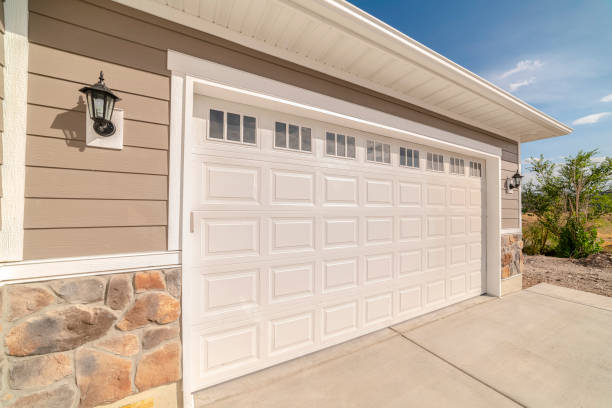Why Regular Garage Door Maintenance Is More Important Than You Think
Your garage door is more than just an entryway—it’s a crucial part of your home’s security, energy efficiency, and daily convenience. Yet, it’s one of the most neglected areas when it comes to regular maintenance. Most homeowners only pay attention when something goes wrong, leading to costly garage door repair bills and unexpected breakdowns.
But here’s the thing: Routine garage door maintenance can save you money, enhance security, and prevent accidents. Let’s dive into why you should make it a priority.
The Role of Garage Doors in Home Safety & Convenience
Your garage door does more than just open and close—it plays a vital role in protecting your home and making your life easier.
- Security: A properly functioning garage door keeps intruders out and protects your vehicles and stored items.
- Convenience: A well-maintained door operates smoothly without frustrating jams or loud noises.
- Energy Efficiency: Insulated garage doors help regulate indoor temperatures, lowering energy bills.
Ignoring maintenance can lead to inconvenient malfunctions or even security breaches. That’s why regular servicing is essential.
Key Components of a Garage Door That Need Regular Maintenance
A garage door system has multiple moving parts, each of which requires attention to function optimally.
1. Springs & Cables: The Power Behind Your Door
Garage door springs and cables bear the weight of the door. Over time, they wear out due to constant tension and movement.
- Signs of wear: gaps in springs, loose cables, or difficulty in lifting the door.
- Why it matters: A broken spring can cause sudden door failure, leading to serious injuries.
- Prevention tip: Schedule an annual check-up to avoid unexpected garage door repair costs.
2. Rollers & Tracks: Ensuring Smooth Operation
Rollers and tracks guide your garage door as it opens and closes. Dirt, rust, or misalignment can cause it to get stuck or operate noisily.
- Common issues: grinding noises, shaky movement, or derailment.
- Maintenance tip: Clean tracks regularly and lubricate rollers to ensure smooth operation.
3. Garage Door Opener & Sensors: Your Door’s Brain
A faulty garage door opener or malfunctioning sensors can make your door unsafe.
- Warning signs: The door reverses unexpectedly or doesn’t close completely.
- Maintenance check: Ensure sensors are aligned and test the auto-reverse function monthly.
4. Weather Seals & Insulation: Protecting Your Home
Weather seals prevent cold air, dust, and pests from entering your garage. Over time, they wear out, reducing insulation efficiency.
- Fix: Replace worn-out seals every few years to maintain energy efficiency and keep your garage clean.
What Happens When You Neglect Garage Door Maintenance?
Ignoring maintenance might seem harmless, but here’s what can happen:
- Increased Safety Risks: Faulty doors can unexpectedly close, posing a hazard to children and pets.
- Higher Repair Costs: Small issues turn into expensive garage door repair jobs if left unchecked.
- Shortened Lifespan: A neglected garage door system wears out faster, leading to premature replacement.
Regular check-ups prevent these issues, saving you time, money, and stress.
How Often Should You Service Your Garage Door?
Experts recommend the following maintenance schedule:
- Monthly DIY checks: Look for wear and tear, lubricate moving parts, and test door balance.
- Professional inspection: Get a tune-up at least once a year to catch potential issues early.

DIY Garage Door Maintenance Tips
Want to keep your garage door in top shape between professional visits? Here are some easy DIY maintenance tips:
- Lubricate moving parts: Use silicone-based lubricant on springs, rollers, and hinges.
- Check for wear and tear: Look for loose bolts, frayed cables, or rusted parts.
- Test the balance: Disconnect the opener and manually lift the door halfway—if it doesn’t stay put, the springs may need adjustment.
While DIY maintenance is helpful, some tasks require a professional’s expertise.
When to Call a Professional for Garage Door Repair
Certain garage door problems require expert handling to avoid injuries or further damage.
Signs You Need a Pro:
- Loud banging noises when operating the door.
- The door refuses to open or close.
- Sagging sections or misalignment.
- Broken springs or cables.
Attempting DIY repairs on major issues can be dangerous. A professional garage door repair technician has the tools and expertise to fix problems safely.
The Cost-Saving Benefits of Preventive Garage Door Maintenance
A simple annual maintenance check can prevent costly breakdowns and extend the lifespan of your garage door.
Real-life example: A homeowner who ignored squeaky springs ended up with a snapped cable, costing $500 in repairs. If they had serviced it earlier, a $50 lubricant job could have saved them hundreds.
Investing in routine maintenance means fewer unexpected expenses down the road.
Choosing the Right Garage Door Repair Service
If your garage door needs professional care, choosing the right service provider is crucial.
What to Look For:
- Licensed and insured technicians.
- Positive customer reviews.
- Transparent pricing with no hidden fees.
- Emergency services availability.
Before hiring a company, ask about their experience and warranty policies.
Conclusion
Your garage door is a key part of your home, yet it’s often overlooked—until something goes wrong. Regular maintenance ensures smooth operation, improves safety, and prevents costly garage door repair bills.
Don’t wait until your garage door fails—schedule a maintenance check today!
Frequently Asked Questions (FAQs)
1. How often should I lubricate my garage door?
Lubricate moving parts every 3-6 months to keep them running smoothly.
2. Can I replace garage door springs myself?
No! Garage door springs are under high tension and can cause serious injuries if handled improperly. Always call a professional.
3. Why is my garage door making a loud noise?
Loud noises may indicate loose hardware, worn rollers, or a lack of lubrication. Regular maintenance can fix these issues.
4. What’s the average lifespan of a garage door?
With proper maintenance, a garage door can last 15-30 years.
5. How much does a professional garage door repair cost?
Costs vary depending on the issue but typically range from $100 to $500. Regular maintenance can prevent expensive repairs.













